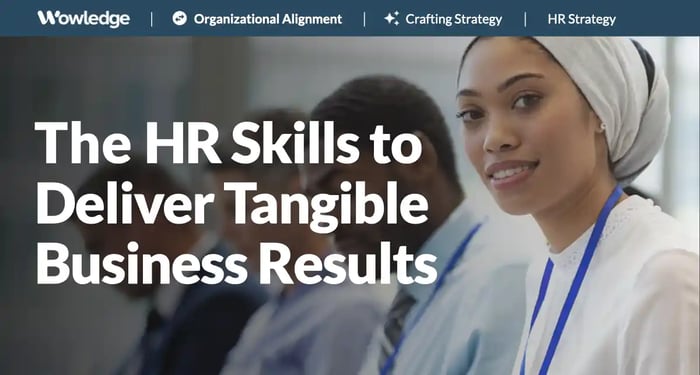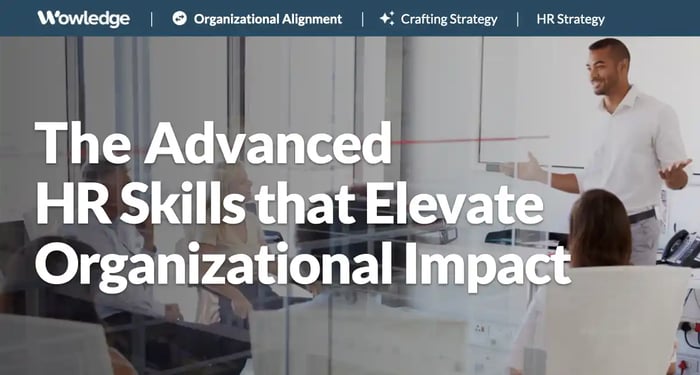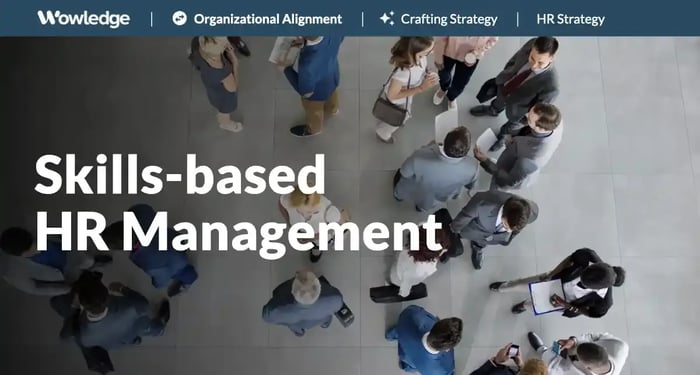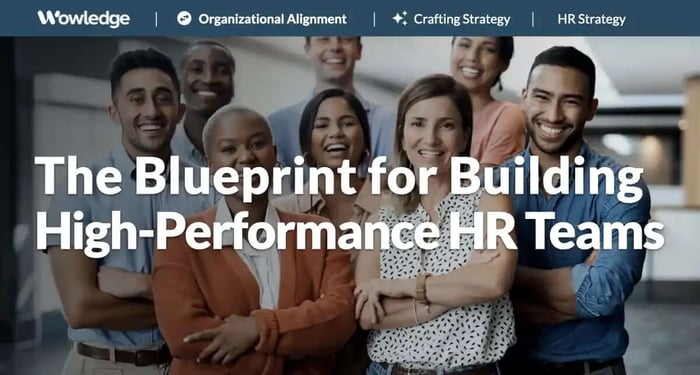Table of Contents
HR careers rarely follow a single, linear path, yet success across roles depends on a common foundation of skills and capabilities. Developing HR skills through continuous learning and skill development is essential to meeting role requirements while staying abreast of trends and changes. It also calls for an appreciation of the traits and capabilities individuals bring to the various HR roles, which help enable their development and success.
That led to further consideration of 1) the skills needed to succeed in HR and 2) how great HR impacts the business. The intersection of those two creates the greatest opportunity for HR: how to select and develop the most impactful HR team members across HR functions.
Creating robust business contributions and employee experiences requires business-aligned strategies, people with the right capabilities, the right structure and delivery model, proper deployment of technologies, and the agility to change course through critical trend anticipation and responsiveness. However, those start with understanding how HR creates maximized value and developing HR skills and capabilities to design and execute against all other elements. Before identifying and developing HR skills, consider how HR can create a differentiated impact that delivers tangible business results.
How HR impacts business outcomes
Achieving impact on business objectives is a critical goal for HR programs and initiatives, yet it remains a “holy grail” for many. The challenges to that are well established, beginning with the tendency of HR teams to measure HR processes and outcomes (as KPIs for HR efforts and contributions) without reference to business metrics and outcomes. The lack of business-impact metrics and analyses is highly curable and highly desirable. It is clearly an opportunity for developing HR skills, yet it is linked to a shortage of trained and experienced HR professionals. Regardless, a body of research demonstrates the strength of the connection between HR practices and business outcomes.
For example, Gallup analyzed over 450 studies demonstrating that high employee engagement produces 23% greater profitability and other desirable talent outcomes, with cost benefits to the business (e.g., lowered absenteeism and turnover). HR routinely assesses and improves employee engagement scores, and the benefits to the business can be substantial, making it an opportunity for developing HR skills. Similarly, when HR successfully links individual performance goals to the business's key objectives through improved goal-setting and performance management process design, the benefits to the business are significant. Gartner found that companies achieve a 22% boost in employee performance when worker goals are closely aligned with company objectives.
Research by McKinsey demonstrated that companies that frequently reallocate and assign their high performers to critical strategic priorities deliver over twice (2.2X) the total return to shareholders (TRS) than their competitors. Such agile worker deployment is a talent strategy leveraged by leading organizations and serves as a key contribution that HRBPs and CHROs can make through a combination of critical workforce segmentation (CWS), talent strategy, and workforce mobility policies and practices. This represents another opportunity for developing HR skills.
As HR teams increasingly focus on employee experience (EX) as a driver of retention and recruitment, robust EX has also been shown to deliver significantly enhanced business outcomes. One study showed that by improving skill development, internal mobility, and employee retention, revenue could increase by more than 50% and profits by 45%. Furthermore, organizations that successfully deliver a positive employee experience are 1.3 times more likely to outperform their competitors.
Much research has demonstrated statistically significant relationships between measures of HR practices and firm profitability. One such study by Wright, Gardner, and Moynihan (2003) found that advanced HR practices and high levels of employee commitment were significantly related to lower operating expenses and higher profitability. Leadership perceptions track similarly, with 99% of leaders considering their talent management practices “very effective” at improving performance and beating the competition. Interestingly, the three reasons for such contributions to corporate performance offer keys to developing HR skills - the agile movement/allocation of talent, creating a positive employee experience, and HR’s comprehensive understanding of business strategies and priorities. McKinsey reports that those companies with the highest “organizational health” (culture, skills and learning, motivation, etc.) plus positive management practices and employee experience, much of which HR directly drives or influences, enjoy shareholder returns 60% higher than median companies, and 200% higher than bottom-quartile performers.
An interesting study by the Boston Consulting Group examined the impact of various HR specialties/subfunctions and found strong, positive linkages between “high capability” HR functions and profit growth and margins, driven primarily by talent management processes and initiatives. Those top HR function companies outperformed the lower ones by between 160% to 350% in profit growth and 120% to 160% in profit margin.
What this tells us about the most critical HR capabilities that impact the business
What are the takeaways from the research? HR functions must focus on developing the HR skills and capabilities that have the greatest impact on the business. Developing HR skills based on what drives business outcomes is core to the proposition of creating more value from the function. The list will not surprise anyone in the field, as these tend to get much coverage in the business and HR press, social media outlets, and conference circuits. The key ones identified above include:
- Employee engagement
- Employee experience
- Employee retention
- Employee mobility and talent allocation
- Culture development
- Leadership and management development
- Performance management and goal setting
- Skills development
Understanding what is needed to succeed in HR means learning the capabilities required to decide how and where each can be best deployed to address business objectives and challenges. That calls for understanding and developing HR skills in such disciplines and methodologies as organization development (OD), HR analytics, performance consulting, coaching, process improvement (Lean, Six Sigma, Agile), and employee listening, among others. Those are approaches to understand and specify the issues to be addressed, identify their root causes, select solution options, design the solution, and assess the degree of success in addressing the need.
A second way to envision the skill sets necessary for success is to understand how to create policies, practices, programs, and processes that drive and sustain each of these, which relies on developing HR skills and expertise through education, training, and experience in each area. That means learning the principles, functions, and techniques needed to build and/or refine a comprehensive capability based upon established leading practices and infrastructure elements in the core HR functions such as talent management, compensation, benefits, learning and development, leadership development, workforce planning, measurement and reporting, HRIS, etc. Developing HR skills in areas of interest is a well-established path to career development.
So, the development and deployment of a sustainably impactful HR function rely on the skills and capabilities of its members and on the successful deployment and management of those skills and capabilities by its leaders. The ability of an HR function to operate in that manner requires an understanding of the relative value of each role, the types of people and the skills they bring to perform its essential functions, and the initiatives and programs those people will create and execute.

The key traits and skills needed to succeed in HR
HR encompasses a variety of roles, each demanding a distinct set of skills to effectively address their unique challenges and responsibilities. While not all HR roles are equal in their strategic contribution, each plays a vital part in the organization's design and delivery of services, from administrative support to strategic issue management. Developing HR skills requires thought and is best envisioned in terms of the traits that successful practitioners in each function bring to the table. To that end, a brief review of the ideal traits and skills required for each HR function follows, designed to spark a conversation about how current job holders can build their skill and experience portfolios. At the same time, those who aspire to the roles can educate and prepare themselves appropriately.
1. Recruitment and Talent Acquisition
Traits
- Listening and empathy: Understanding candidates' perspectives and needs to fairly engage with them and create a positive candidate experience.
- Intuition: Gauging a candidate's fit for the company culture and the role beyond what's on their resume.
- Persistence: Continuously seeking the right talent despite challenges and setbacks.
Skills Required
- Communication and interpersonal skills: To interact with candidates effectively, convey the company culture, and understand candidate needs.
- Negotiation skills: For offering competitive compensation packages and benefits.
- Marketing skills: To promote the company effectively to potential hires.
- Analytical skills: To evaluate the effectiveness of recruitment strategies and understand job market trends.
- Candidate assessment: hiring against standards for skill/experience match, cultural fit, and growth potential.
2. Learning and Development
Traits
- Passion for learning: A genuine interest in creating and driving personal growth and the development of others.
- Creativity: Developing engaging and effective training programs and development strategies that cater to diverse learning styles.
- Patience: Understanding that skill development and learning take time, and showing persistence in employee development.
- Curiosity: Interest in learning about targeted learner needs and preferences, business demands, new technologies, and design/delivery methods.
Skills Required
- Instructional design: To develop training programs and development practices that meet learning objectives while engaging the learner.
- Presentation skills: To deliver engaging and effective training sessions, create engaging eLearning and other technology-based programs.
- Assessment and evaluation: To measure the effectiveness of training programs and employee progress, including building in checkpoints and post-learning assessments.
- Adaptability: To update training programs to the changing needs, preferences, and styles of the organization and its employees, and to engage learners with recommendations for further relevant programming.
- Performance consulting: Ability to assess performance shortcomings (at the individual and group levels) and follow a disciplined approach to identifying and creating solutions that address those issues' root cause(s).
3. Employee Relations
Traits
- Compassion and emotional intelligence: Showing genuine concern for employees' well-being and professional growth.
- Fairness: Being impartial and equitable in handling disputes and grievances.
- Resilience: Managing stress and "bouncing back" from difficult situations with a positive outlook.
Skills Required
- Empathy and listening skills: To understand employee issues and concerns genuinely.
- Conflict resolution and mediation: To resolve disputes between employees or between employees and management.
- Knowledge of labor laws and regulations: To ensure the company's policies comply with legal standards.
- Strategic thinking: To align employee relations strategies with overall business goals and assess/address issues with a clear understanding of operational requirements.
4. Compensation and Benefits
Traits
- Analytical action and thinking: Looking both into and beyond the numbers to understand the impact of compensation on employee satisfaction and company culture.
- Innovativeness: Finding creative solutions to offer competitive and cost-effective compensation packages that effectively and simultaneously address talent and business challenges.
- Ethical judgment: Making decisions that are fair, transparent, and in the best interest of both the employees and the company.
- Attention to detail: Ability and patience to delve into a variety of datasets, market inputs, and calculations to derive logical and consistent solutions to a wide range of position types.
Skills Required
- Numerical and financial acumen: To manage pay structures and benefits packages effectively.
- Negotiation skills: To deal with vendors and service providers.
- Knowledge of tax and labor laws: To ensure compliance with regulations concerning compensation and benefits.
- Analytical skills: For assessing the value of a wide range of jobs, benchmarking compensation against industry standards, and managing assigned budgets.
5. Diversity and Inclusion
Traits
- Open-mindedness: Welcoming diverse perspectives and challenging one's own biases.
- Inclusivity: Actively creating environments where different voices are heard and valued.
- Courage: Addressing and challenging discriminatory practices and policies, even when it's difficult.
Skills Required
- Cultural awareness: To understand and appreciate the value of diverse perspectives in the workplace.
- Strategic planning: To develop and implement diversity and inclusion strategies that align with business requirements and objectives.
- Training and facilitation: To educate employees on diversity and inclusion topics.
- Empathy: To foster an inclusive environment where all employees feel valued.
6. HR Information Systems (HRIS)
Traits
- Tech-savviness: A natural inclination towards technology and its potential to streamline HR processes, and capture/report on trends.
- Curiosity: An eagerness to explore and integrate new technologies and systems to improve efficiency.
- Detail-oriented: Paying close attention to the intricacies of data and system configurations to avoid errors.
Skills Required
- Technical skills: To manage HR software and systems efficiently.
- Data analysis: To generate data on employee performance, compensation, and other HR metrics.
- Project management: To oversee the implementation of new systems or upgrades.
- Problem-solving: To troubleshoot issues with HRIS software and improve system efficiency.
7. HR Measurement and Reporting
Traits
- Analytical mindset: Ability to dissect complex data sets to find patterns, trends, and insights that can inform HR strategies.
- Attention to detail: Precision in handling data, ensuring accuracy in metrics and reports, which are critical for decision-making.
- Ethical judgment: Handling sensitive employee data requires strict confidentiality and adherence to ethical standards to protect privacy and comply with regulations.
- Proactivity: Anticipating the needs of the HR department and the organization by foreseeing future reporting requirements and developing metrics accordingly.
- Adaptability: Being open to and capable of handling rapid changes in data, technology, and organizational needs without losing sight of ongoing projects.
Skills Required
- Data analysis: Proficiency in statistical analysis and the ability to use data analysis tools (e.g., Excel, SQL, R, Python) to interpret HR data.
- HR knowledge: Understanding of HR processes and how they align with organizational goals, and what metrics are most valuable to track and analyze.
- Reporting visualization tool proficiency: Experience with HR Information Systems (HRIS) and reporting tools (e.g., Tableau, Power BI) to create dashboards and reports.
- Communication: Ability to communicate complex data in a clear and understandable manner to stakeholders at all levels of the organization, including non-technical audiences.
- Project management: Skills in managing projects, including setting timelines, coordinating with other team members, and meeting deadlines.
8. HR Shared Services
Traits
- Customer service orientation: A strong focus on providing excellent service to employees, addressing their HR-related queries with empathy, patience, and understanding.
- Communication skills: Ability to communicate clearly and effectively verbally and in writing to ensure that all interactions are understood and actionable.
- Problem-solving ability: Capable of diagnosing issues quickly and finding effective solutions, especially when dealing with various HR-related requests.
- Adaptability: Comfortable working in a fast-paced environment and able to easily adjust to changing priorities and demands.
- Teamwork: A collaborative team player who can work effectively with colleagues across different areas of HR and the broader organization.
Skills Required
- HR knowledge: A solid understanding of HR practices and legislation to provide accurate information and ensure compliance in all transactions.
- Technology proficiency: Familiarity with HR Information Systems (HRIS) and other relevant software tools that are used to manage employee data and process HR requests.
- Data entry and management: Accurate and efficient data entry skills, ensuring that employee records are up-to-date and correctly maintained.
- Process management: Ability to understand, follow, and improve HR processes to enhance efficiency and service delivery within the shared services model.
- Multitasking: Capability to handle multiple queries and tasks simultaneously without compromising the quality of work or service levels.
9. HRBP
Traits
- Strategic thinking: Ability to understand the broader business strategy and align HR initiatives to support these goals.
- Empathy and emotional intelligence: Capacity to relate to, understand, and manage interactions with people across all levels of the organization, recognizing their needs and concerns.
- Influential and persuasive: Being able to influence decision-making processes and persuade stakeholders about the importance of HR initiatives in achieving business outcomes.
- Adaptability and flexibility: The business environment is dynamic; hence, being able to adapt strategies and plans to changing business needs is crucial.
- Problem-solving attitude: A proactive approach to identifying issues and finding effective solutions that benefit both the employees and the organization.
- Integrity and discretion: Handling sensitive information with confidentiality and making decisions that foster trust and respect within the organization.
Skills Required
- Business acumen: Understanding the industry, the company's position within it, and how HR practices contribute to business success.
- HR expertise: Comprehensive knowledge of HR functions, laws, and best practices, including talent management, compensation and benefits, organization development, employee listening, and process improvement strategies and techniques.
- Communications: Exceptional ability to communicate clearly and effectively to various audiences within the organization, both verbally and in writing.
- Analytical skills: Ability to analyze data and metrics to inform HR strategies and measure their impact on the business, and guide the creation of new statistical analyses that shed light on previously unseen trends and occurrences.
- Change management: Skills in managing organizational change, including understanding how to manage employee expectations, communication strategies, and transition plans.
- Stakeholder management: The ability to manage relationships with key stakeholders, understand their needs and concerns, and work collaboratively to address them.
10. HR Strategy and Leadership
Traits
- Visionary thinking: The ability to foresee future challenges and opportunities for the HR function and the organization.
- Inspirational: Motivating and leading by example, inspiring others to achieve their best.
- Adaptability: Embracing change and leading the organization through change flexibly and gracefully.
- Engages with trust and credibility: Builds relationships based on mutual respect and collaboration, bringing highly valued insights and observations to conversations, and maintains confidentiality and agreements.
Skills Required
- Strategic vision: To align HR policies and practices with the organization's long-term goals.
- Leadership: To inspire and lead the HR team effectively and create productive alliances/bonds with other functions and business units.
- Coaching: To provide guidance and provoke thought, new ideas, and professional development among members of the leadership team and beyond.
- Change management: To manage and guide the organization through organizational changes and ensure smooth transitions.
- Business acumen: To understand the broader business context and how HR contributes to it.
Choosing a role in HR
Selecting a role or function in HR that is of interest should involve assessing an individual’s strengths, work-style preferences, and professional ambitions. In each function, opportunities to exercise strategic thinking and planning exist in higher-level roles, as does the prospect of interacting with and advising higher-level executives or of creating a future vision. What matters most to those who have succeeded in any of those areas of specialization is the ability to do the type of work that best fits them, in the style that they are most comfortable with, at a pace they operate at most effectively, and with the proper amount of certainty versus ambiguity around the types of problems or challenges they face. An honest assessment of one’s preferences, ambitions, and limitations is necessary for successfully navigating an HR career while offering the most value to an organization.
Relevant Practices & Tools
Developing a Winning Talent Strategy to Identify Key Capabilities and the Most Appropriate Workforce Mix. >
A talent strategy defines the talent needs and associated objectives necessary to meet top business goals. It is both an integral part of the HR strategic plan and a direct informer... more »
Reskilling (and Upskilling) Explainer: Mastering the Fundamentals. >
"Reskilling" refers to training employees to take on entirely new roles or professions, often in response to shifts in the industry, technology, or market demands... more »
People Operations Explainer: Mastering the Fundamentals. >
People Operations, often termed 'People Ops,' is a modern approach to human resources that prioritizes employee-centric practices to foster workplace culture, boost engagement... more »
CHRO Success Profile: Deep Dive. >
The Chief Human Resources Officer (CHRO), once perceived as merely a support function, has undergone a significant evolution, now standing as a strategic partner and a critical member... more »
HR Business Partner Success Profile: Deep Dive. >
An HR Business Partner (HRBP) is a strategic role within the Human Resources function, closely collaborating with business leaders to align HR strategies with business objectives... more »
FAQs
How can HR link its initiatives to business outcomes from the outset?
Start with a single business question framed in the language of the P&L statement (e.g., profitability, revenue, operating expenses), then brainstorm a few HR levers most likely to influence it. Define a baseline and a small set of leading indicators (manager coaching frequency, internal fill rate) that should move before their impact on lagging outcomes (revenue per FTE, first-year retention) follows. Agree on data sources and review the analysis cadence with Finance so progress is audited and comparable to other investments. Build a one-page logic model that ties initiative activities to the metrics leaders already track.
Which HR roles deliver the fastest lift in business impact when headcount is limited?
Priority hires are a People Analytics lead who can translate HR impact to business or financial outcomes, a senior HRBP with strong industry acumen and consulting skills, and a Talent Architect to codify skills, career paths, and internal mobility opportunities. This trio enables better decisions, tighter alignment between HR roles and strategy, and measurable improvements in job vacancy fill quality and speed. Augment with project-based specialists for compensation design or learning engineering as needs arise. Concentrating expertise here creates multiplier effects across other HR activities.
How can small HR teams sequence improvements with tight capacity?
Adopt a quarterly theme tied to a single business objective and limit work-in-progress to 2 or 3 initiatives. Start where cycle time and cost are most visible, such as internal mobility, manager routines, or frontline hiring, and publish quick wins to build credibility. Reuse templates, playbooks, and analytics patterns to reduce effort per project. Sunset or pause low-value and low-impact activities to free capacity for higher-impact work.
How can HR prevent capability decay and sustain gains after initial upskilling?
Embed new practices into operating rhythms and performance expectations by adopting them as performance standards, such as with business plans, formal Lean root cause and quantitative analysis for all issue resolution proposals, standard agenda items, dashboards, and review cadences, so skills are exercised weekly. Tie career progression to continuous application demonstration, not course completion, using portfolios of completed work projects as evidence. Rotate HR staff through business units and cross-functional project teams to keep context fresh. Refresh curricula annually based on post-implementation reviews and evolving strategy.










